Organisational Behaviour Report: Individual, Team Performance Analysis
VerifiedAdded on 2020/12/09
|18
|5002
|437
Report
AI Summary
This report provides a comprehensive analysis of organisational behaviour within the context of A David & Co. It examines the impact of organisational culture, politics, and power on individual and team performance, utilizing Handy's model of organisational culture to illustrate different cultural types and their effects. The report delves into the process and content theories of motivation, particularly focusing on Maslow's need theory, to understand how employee needs influence their performance. Furthermore, it contrasts effective and ineffective team dynamics, highlighting the factors that contribute to team success and failure. The concepts and philosophies of organisational behaviour are discussed, offering insights into how these elements shape individual actions within a business setting. The report concludes by summarizing the key findings and their implications for organisational management and employee well-being.
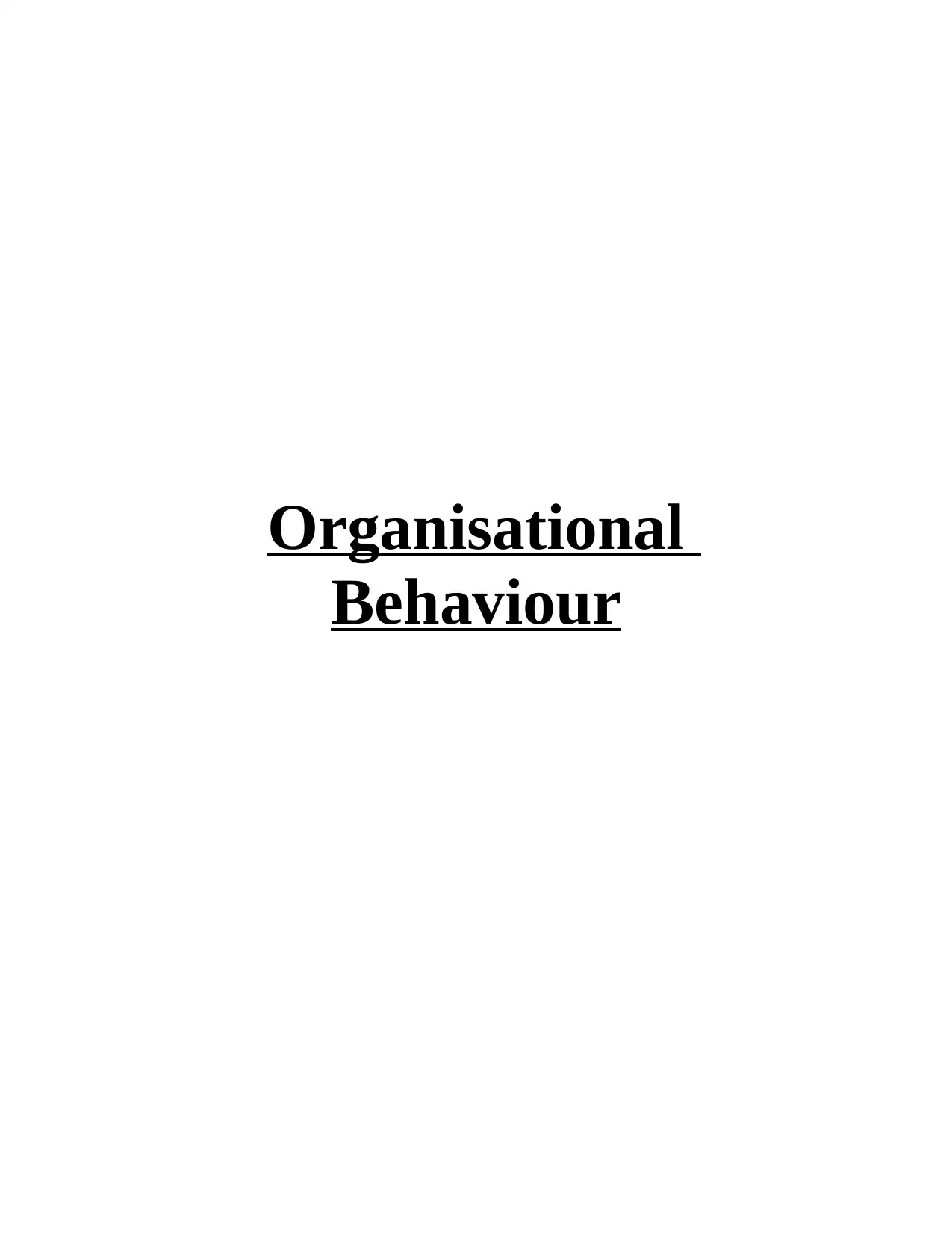
Organisational
Behaviour
Behaviour
Paraphrase This Document
Need a fresh take? Get an instant paraphrase of this document with our AI Paraphraser
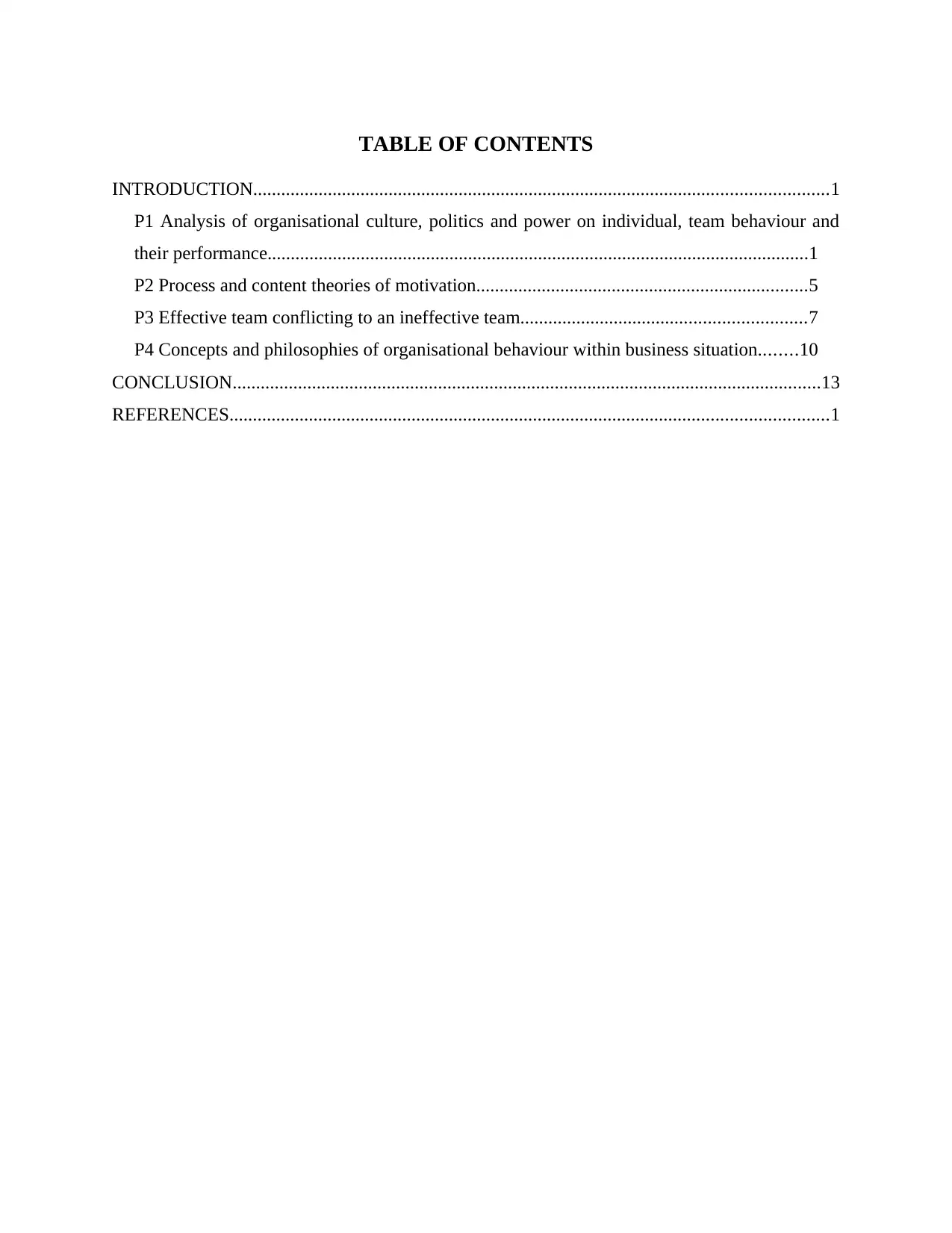
TABLE OF CONTENTS
INTRODUCTION...........................................................................................................................1
P1 Analysis of organisational culture, politics and power on individual, team behaviour and
their performance....................................................................................................................1
P2 Process and content theories of motivation.......................................................................5
P3 Effective team conflicting to an ineffective team.............................................................7
P4 Concepts and philosophies of organisational behaviour within business situation........10
CONCLUSION..............................................................................................................................13
REFERENCES................................................................................................................................1
INTRODUCTION...........................................................................................................................1
P1 Analysis of organisational culture, politics and power on individual, team behaviour and
their performance....................................................................................................................1
P2 Process and content theories of motivation.......................................................................5
P3 Effective team conflicting to an ineffective team.............................................................7
P4 Concepts and philosophies of organisational behaviour within business situation........10
CONCLUSION..............................................................................................................................13
REFERENCES................................................................................................................................1

⊘ This is a preview!⊘
Do you want full access?
Subscribe today to unlock all pages.

Trusted by 1+ million students worldwide
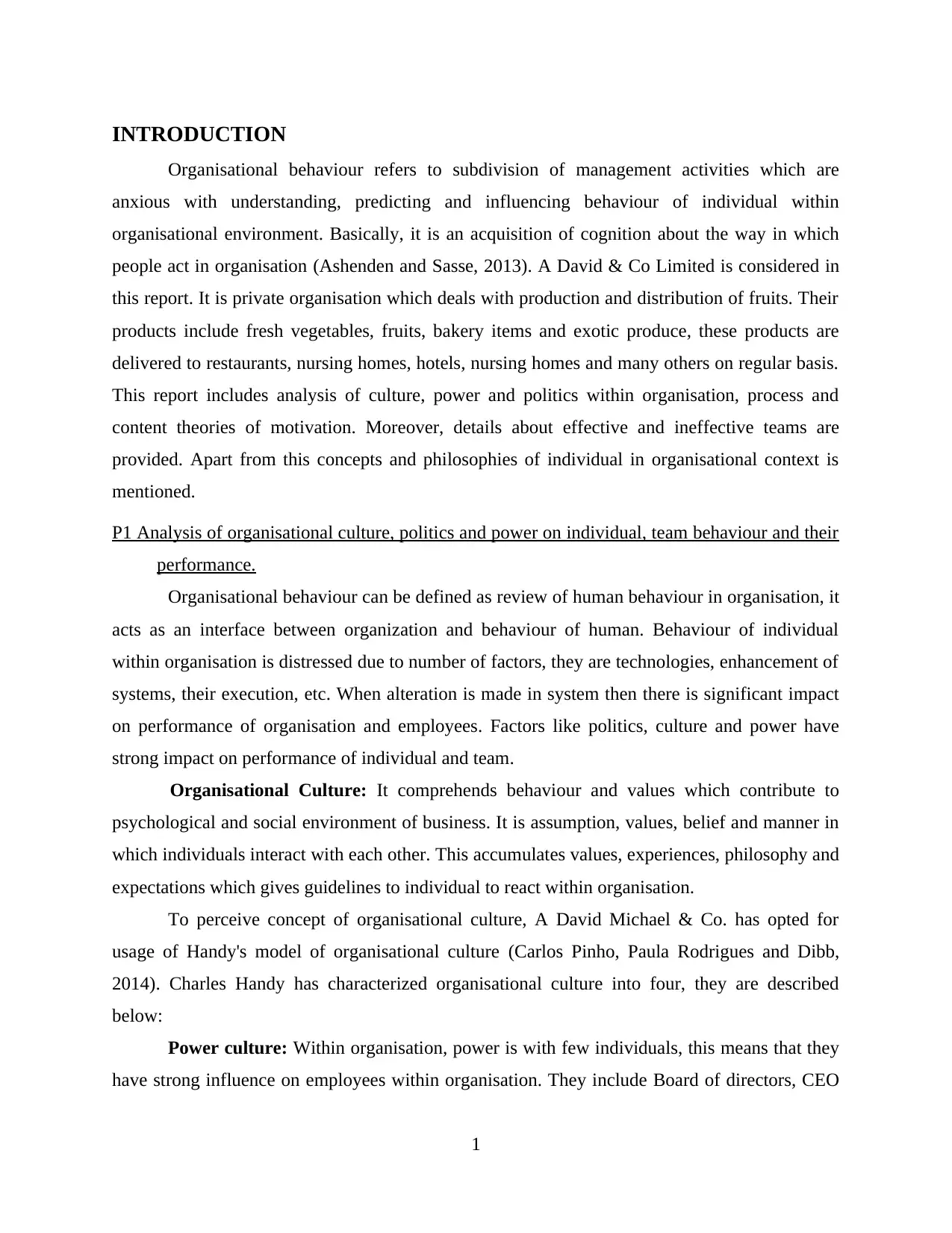
INTRODUCTION
Organisational behaviour refers to subdivision of management activities which are
anxious with understanding, predicting and influencing behaviour of individual within
organisational environment. Basically, it is an acquisition of cognition about the way in which
people act in organisation (Ashenden and Sasse, 2013). A David & Co Limited is considered in
this report. It is private organisation which deals with production and distribution of fruits. Their
products include fresh vegetables, fruits, bakery items and exotic produce, these products are
delivered to restaurants, nursing homes, hotels, nursing homes and many others on regular basis.
This report includes analysis of culture, power and politics within organisation, process and
content theories of motivation. Moreover, details about effective and ineffective teams are
provided. Apart from this concepts and philosophies of individual in organisational context is
mentioned.
P1 Analysis of organisational culture, politics and power on individual, team behaviour and their
performance.
Organisational behaviour can be defined as review of human behaviour in organisation, it
acts as an interface between organization and behaviour of human. Behaviour of individual
within organisation is distressed due to number of factors, they are technologies, enhancement of
systems, their execution, etc. When alteration is made in system then there is significant impact
on performance of organisation and employees. Factors like politics, culture and power have
strong impact on performance of individual and team.
Organisational Culture: It comprehends behaviour and values which contribute to
psychological and social environment of business. It is assumption, values, belief and manner in
which individuals interact with each other. This accumulates values, experiences, philosophy and
expectations which gives guidelines to individual to react within organisation.
To perceive concept of organisational culture, A David Michael & Co. has opted for
usage of Handy's model of organisational culture (Carlos Pinho, Paula Rodrigues and Dibb,
2014). Charles Handy has characterized organisational culture into four, they are described
below:
Power culture: Within organisation, power is with few individuals, this means that they
have strong influence on employees within organisation. They include Board of directors, CEO
1
Organisational behaviour refers to subdivision of management activities which are
anxious with understanding, predicting and influencing behaviour of individual within
organisational environment. Basically, it is an acquisition of cognition about the way in which
people act in organisation (Ashenden and Sasse, 2013). A David & Co Limited is considered in
this report. It is private organisation which deals with production and distribution of fruits. Their
products include fresh vegetables, fruits, bakery items and exotic produce, these products are
delivered to restaurants, nursing homes, hotels, nursing homes and many others on regular basis.
This report includes analysis of culture, power and politics within organisation, process and
content theories of motivation. Moreover, details about effective and ineffective teams are
provided. Apart from this concepts and philosophies of individual in organisational context is
mentioned.
P1 Analysis of organisational culture, politics and power on individual, team behaviour and their
performance.
Organisational behaviour can be defined as review of human behaviour in organisation, it
acts as an interface between organization and behaviour of human. Behaviour of individual
within organisation is distressed due to number of factors, they are technologies, enhancement of
systems, their execution, etc. When alteration is made in system then there is significant impact
on performance of organisation and employees. Factors like politics, culture and power have
strong impact on performance of individual and team.
Organisational Culture: It comprehends behaviour and values which contribute to
psychological and social environment of business. It is assumption, values, belief and manner in
which individuals interact with each other. This accumulates values, experiences, philosophy and
expectations which gives guidelines to individual to react within organisation.
To perceive concept of organisational culture, A David Michael & Co. has opted for
usage of Handy's model of organisational culture (Carlos Pinho, Paula Rodrigues and Dibb,
2014). Charles Handy has characterized organisational culture into four, they are described
below:
Power culture: Within organisation, power is with few individuals, this means that they
have strong influence on employees within organisation. They include Board of directors, CEO
1
Paraphrase This Document
Need a fresh take? Get an instant paraphrase of this document with our AI Paraphraser
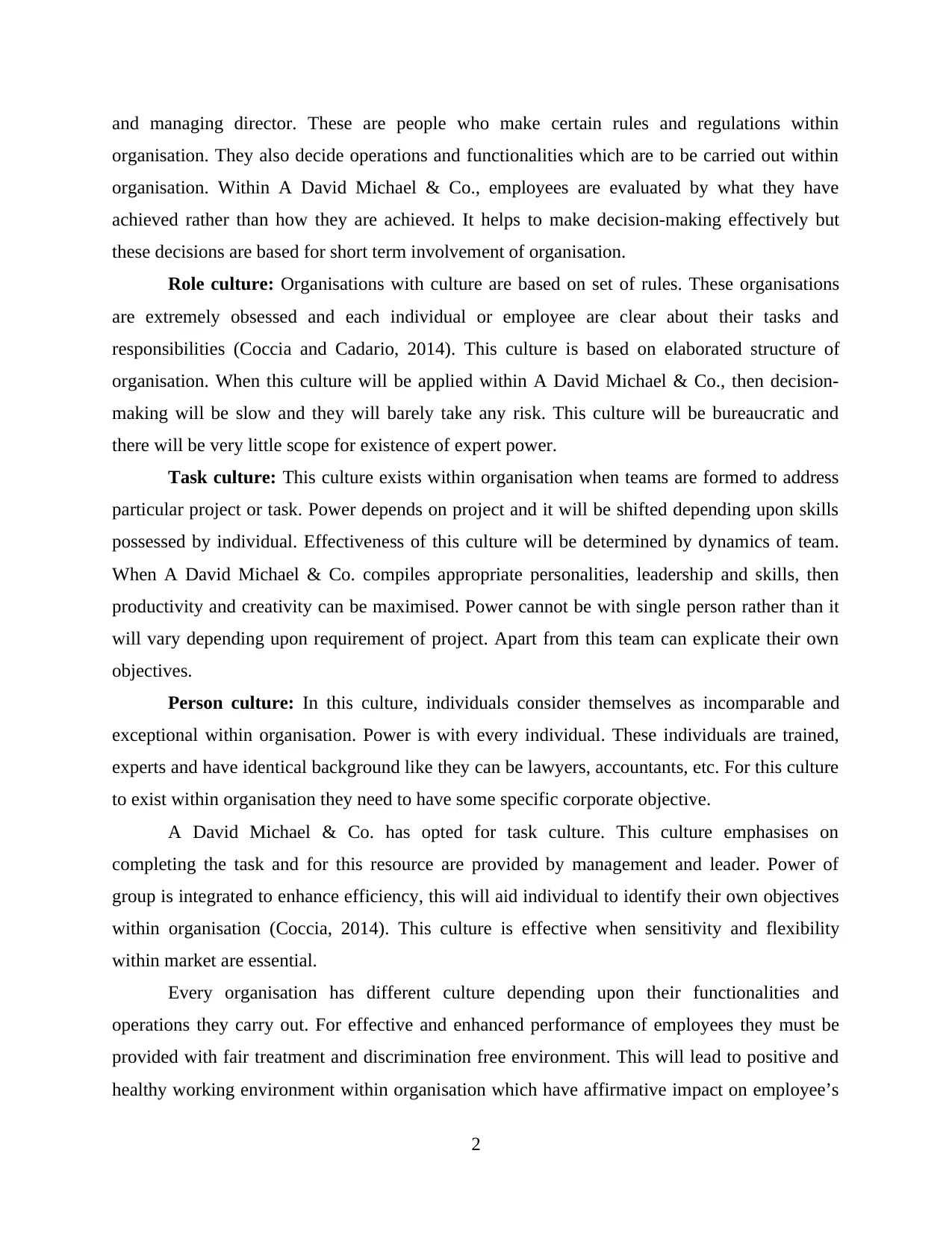
and managing director. These are people who make certain rules and regulations within
organisation. They also decide operations and functionalities which are to be carried out within
organisation. Within A David Michael & Co., employees are evaluated by what they have
achieved rather than how they are achieved. It helps to make decision-making effectively but
these decisions are based for short term involvement of organisation.
Role culture: Organisations with culture are based on set of rules. These organisations
are extremely obsessed and each individual or employee are clear about their tasks and
responsibilities (Coccia and Cadario, 2014). This culture is based on elaborated structure of
organisation. When this culture will be applied within A David Michael & Co., then decision-
making will be slow and they will barely take any risk. This culture will be bureaucratic and
there will be very little scope for existence of expert power.
Task culture: This culture exists within organisation when teams are formed to address
particular project or task. Power depends on project and it will be shifted depending upon skills
possessed by individual. Effectiveness of this culture will be determined by dynamics of team.
When A David Michael & Co. compiles appropriate personalities, leadership and skills, then
productivity and creativity can be maximised. Power cannot be with single person rather than it
will vary depending upon requirement of project. Apart from this team can explicate their own
objectives.
Person culture: In this culture, individuals consider themselves as incomparable and
exceptional within organisation. Power is with every individual. These individuals are trained,
experts and have identical background like they can be lawyers, accountants, etc. For this culture
to exist within organisation they need to have some specific corporate objective.
A David Michael & Co. has opted for task culture. This culture emphasises on
completing the task and for this resource are provided by management and leader. Power of
group is integrated to enhance efficiency, this will aid individual to identify their own objectives
within organisation (Coccia, 2014). This culture is effective when sensitivity and flexibility
within market are essential.
Every organisation has different culture depending upon their functionalities and
operations they carry out. For effective and enhanced performance of employees they must be
provided with fair treatment and discrimination free environment. This will lead to positive and
healthy working environment within organisation which have affirmative impact on employee’s
2
organisation. They also decide operations and functionalities which are to be carried out within
organisation. Within A David Michael & Co., employees are evaluated by what they have
achieved rather than how they are achieved. It helps to make decision-making effectively but
these decisions are based for short term involvement of organisation.
Role culture: Organisations with culture are based on set of rules. These organisations
are extremely obsessed and each individual or employee are clear about their tasks and
responsibilities (Coccia and Cadario, 2014). This culture is based on elaborated structure of
organisation. When this culture will be applied within A David Michael & Co., then decision-
making will be slow and they will barely take any risk. This culture will be bureaucratic and
there will be very little scope for existence of expert power.
Task culture: This culture exists within organisation when teams are formed to address
particular project or task. Power depends on project and it will be shifted depending upon skills
possessed by individual. Effectiveness of this culture will be determined by dynamics of team.
When A David Michael & Co. compiles appropriate personalities, leadership and skills, then
productivity and creativity can be maximised. Power cannot be with single person rather than it
will vary depending upon requirement of project. Apart from this team can explicate their own
objectives.
Person culture: In this culture, individuals consider themselves as incomparable and
exceptional within organisation. Power is with every individual. These individuals are trained,
experts and have identical background like they can be lawyers, accountants, etc. For this culture
to exist within organisation they need to have some specific corporate objective.
A David Michael & Co. has opted for task culture. This culture emphasises on
completing the task and for this resource are provided by management and leader. Power of
group is integrated to enhance efficiency, this will aid individual to identify their own objectives
within organisation (Coccia, 2014). This culture is effective when sensitivity and flexibility
within market are essential.
Every organisation has different culture depending upon their functionalities and
operations they carry out. For effective and enhanced performance of employees they must be
provided with fair treatment and discrimination free environment. This will lead to positive and
healthy working environment within organisation which have affirmative impact on employee’s
2
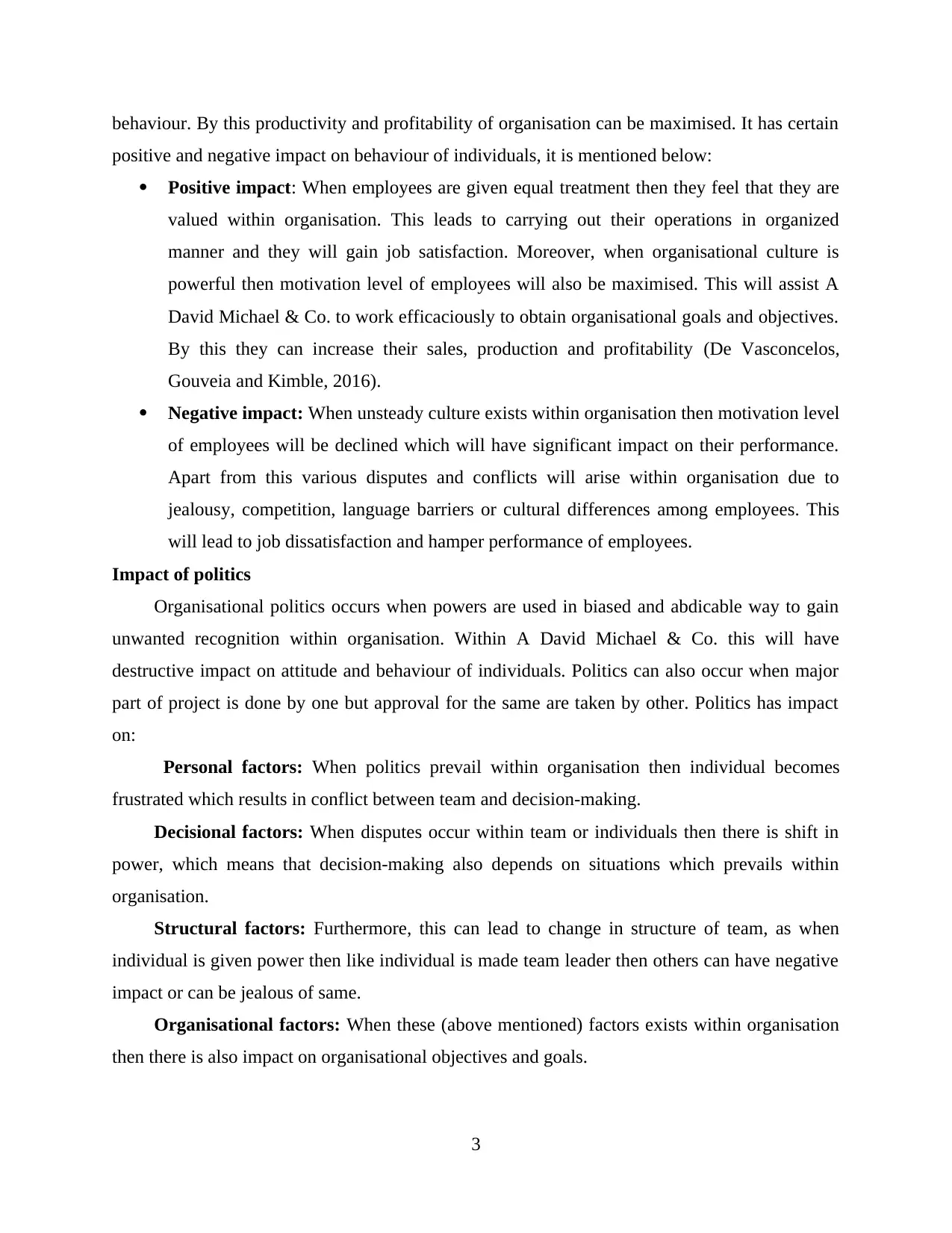
behaviour. By this productivity and profitability of organisation can be maximised. It has certain
positive and negative impact on behaviour of individuals, it is mentioned below:
Positive impact: When employees are given equal treatment then they feel that they are
valued within organisation. This leads to carrying out their operations in organized
manner and they will gain job satisfaction. Moreover, when organisational culture is
powerful then motivation level of employees will also be maximised. This will assist A
David Michael & Co. to work efficaciously to obtain organisational goals and objectives.
By this they can increase their sales, production and profitability (De Vasconcelos,
Gouveia and Kimble, 2016).
Negative impact: When unsteady culture exists within organisation then motivation level
of employees will be declined which will have significant impact on their performance.
Apart from this various disputes and conflicts will arise within organisation due to
jealousy, competition, language barriers or cultural differences among employees. This
will lead to job dissatisfaction and hamper performance of employees.
Impact of politics
Organisational politics occurs when powers are used in biased and abdicable way to gain
unwanted recognition within organisation. Within A David Michael & Co. this will have
destructive impact on attitude and behaviour of individuals. Politics can also occur when major
part of project is done by one but approval for the same are taken by other. Politics has impact
on:
Personal factors: When politics prevail within organisation then individual becomes
frustrated which results in conflict between team and decision-making.
Decisional factors: When disputes occur within team or individuals then there is shift in
power, which means that decision-making also depends on situations which prevails within
organisation.
Structural factors: Furthermore, this can lead to change in structure of team, as when
individual is given power then like individual is made team leader then others can have negative
impact or can be jealous of same.
Organisational factors: When these (above mentioned) factors exists within organisation
then there is also impact on organisational objectives and goals.
3
positive and negative impact on behaviour of individuals, it is mentioned below:
Positive impact: When employees are given equal treatment then they feel that they are
valued within organisation. This leads to carrying out their operations in organized
manner and they will gain job satisfaction. Moreover, when organisational culture is
powerful then motivation level of employees will also be maximised. This will assist A
David Michael & Co. to work efficaciously to obtain organisational goals and objectives.
By this they can increase their sales, production and profitability (De Vasconcelos,
Gouveia and Kimble, 2016).
Negative impact: When unsteady culture exists within organisation then motivation level
of employees will be declined which will have significant impact on their performance.
Apart from this various disputes and conflicts will arise within organisation due to
jealousy, competition, language barriers or cultural differences among employees. This
will lead to job dissatisfaction and hamper performance of employees.
Impact of politics
Organisational politics occurs when powers are used in biased and abdicable way to gain
unwanted recognition within organisation. Within A David Michael & Co. this will have
destructive impact on attitude and behaviour of individuals. Politics can also occur when major
part of project is done by one but approval for the same are taken by other. Politics has impact
on:
Personal factors: When politics prevail within organisation then individual becomes
frustrated which results in conflict between team and decision-making.
Decisional factors: When disputes occur within team or individuals then there is shift in
power, which means that decision-making also depends on situations which prevails within
organisation.
Structural factors: Furthermore, this can lead to change in structure of team, as when
individual is given power then like individual is made team leader then others can have negative
impact or can be jealous of same.
Organisational factors: When these (above mentioned) factors exists within organisation
then there is also impact on organisational objectives and goals.
3
⊘ This is a preview!⊘
Do you want full access?
Subscribe today to unlock all pages.

Trusted by 1+ million students worldwide
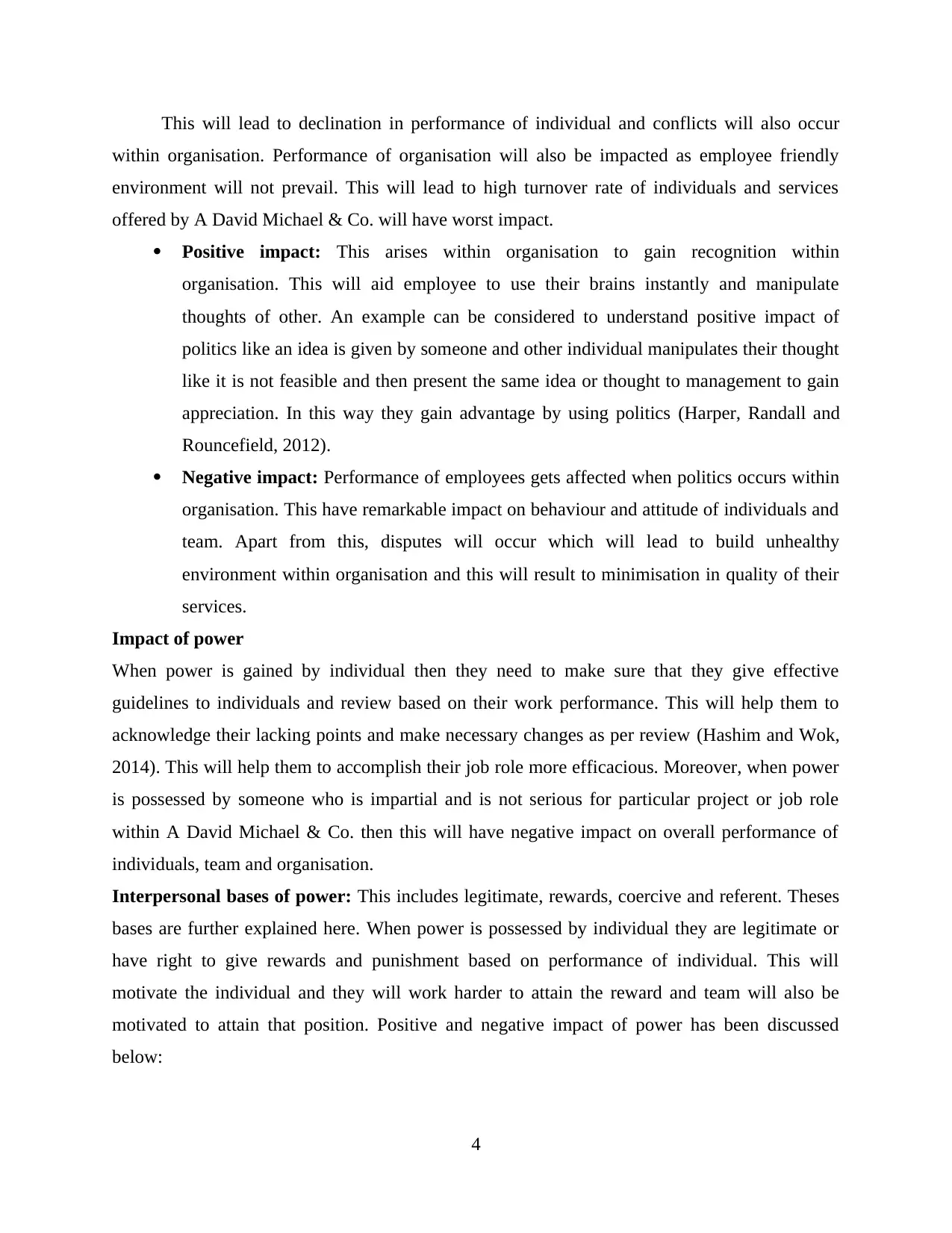
This will lead to declination in performance of individual and conflicts will also occur
within organisation. Performance of organisation will also be impacted as employee friendly
environment will not prevail. This will lead to high turnover rate of individuals and services
offered by A David Michael & Co. will have worst impact.
Positive impact: This arises within organisation to gain recognition within
organisation. This will aid employee to use their brains instantly and manipulate
thoughts of other. An example can be considered to understand positive impact of
politics like an idea is given by someone and other individual manipulates their thought
like it is not feasible and then present the same idea or thought to management to gain
appreciation. In this way they gain advantage by using politics (Harper, Randall and
Rouncefield, 2012).
Negative impact: Performance of employees gets affected when politics occurs within
organisation. This have remarkable impact on behaviour and attitude of individuals and
team. Apart from this, disputes will occur which will lead to build unhealthy
environment within organisation and this will result to minimisation in quality of their
services.
Impact of power
When power is gained by individual then they need to make sure that they give effective
guidelines to individuals and review based on their work performance. This will help them to
acknowledge their lacking points and make necessary changes as per review (Hashim and Wok,
2014). This will help them to accomplish their job role more efficacious. Moreover, when power
is possessed by someone who is impartial and is not serious for particular project or job role
within A David Michael & Co. then this will have negative impact on overall performance of
individuals, team and organisation.
Interpersonal bases of power: This includes legitimate, rewards, coercive and referent. Theses
bases are further explained here. When power is possessed by individual they are legitimate or
have right to give rewards and punishment based on performance of individual. This will
motivate the individual and they will work harder to attain the reward and team will also be
motivated to attain that position. Positive and negative impact of power has been discussed
below:
4
within organisation. Performance of organisation will also be impacted as employee friendly
environment will not prevail. This will lead to high turnover rate of individuals and services
offered by A David Michael & Co. will have worst impact.
Positive impact: This arises within organisation to gain recognition within
organisation. This will aid employee to use their brains instantly and manipulate
thoughts of other. An example can be considered to understand positive impact of
politics like an idea is given by someone and other individual manipulates their thought
like it is not feasible and then present the same idea or thought to management to gain
appreciation. In this way they gain advantage by using politics (Harper, Randall and
Rouncefield, 2012).
Negative impact: Performance of employees gets affected when politics occurs within
organisation. This have remarkable impact on behaviour and attitude of individuals and
team. Apart from this, disputes will occur which will lead to build unhealthy
environment within organisation and this will result to minimisation in quality of their
services.
Impact of power
When power is gained by individual then they need to make sure that they give effective
guidelines to individuals and review based on their work performance. This will help them to
acknowledge their lacking points and make necessary changes as per review (Hashim and Wok,
2014). This will help them to accomplish their job role more efficacious. Moreover, when power
is possessed by someone who is impartial and is not serious for particular project or job role
within A David Michael & Co. then this will have negative impact on overall performance of
individuals, team and organisation.
Interpersonal bases of power: This includes legitimate, rewards, coercive and referent. Theses
bases are further explained here. When power is possessed by individual they are legitimate or
have right to give rewards and punishment based on performance of individual. This will
motivate the individual and they will work harder to attain the reward and team will also be
motivated to attain that position. Positive and negative impact of power has been discussed
below:
4
Paraphrase This Document
Need a fresh take? Get an instant paraphrase of this document with our AI Paraphraser
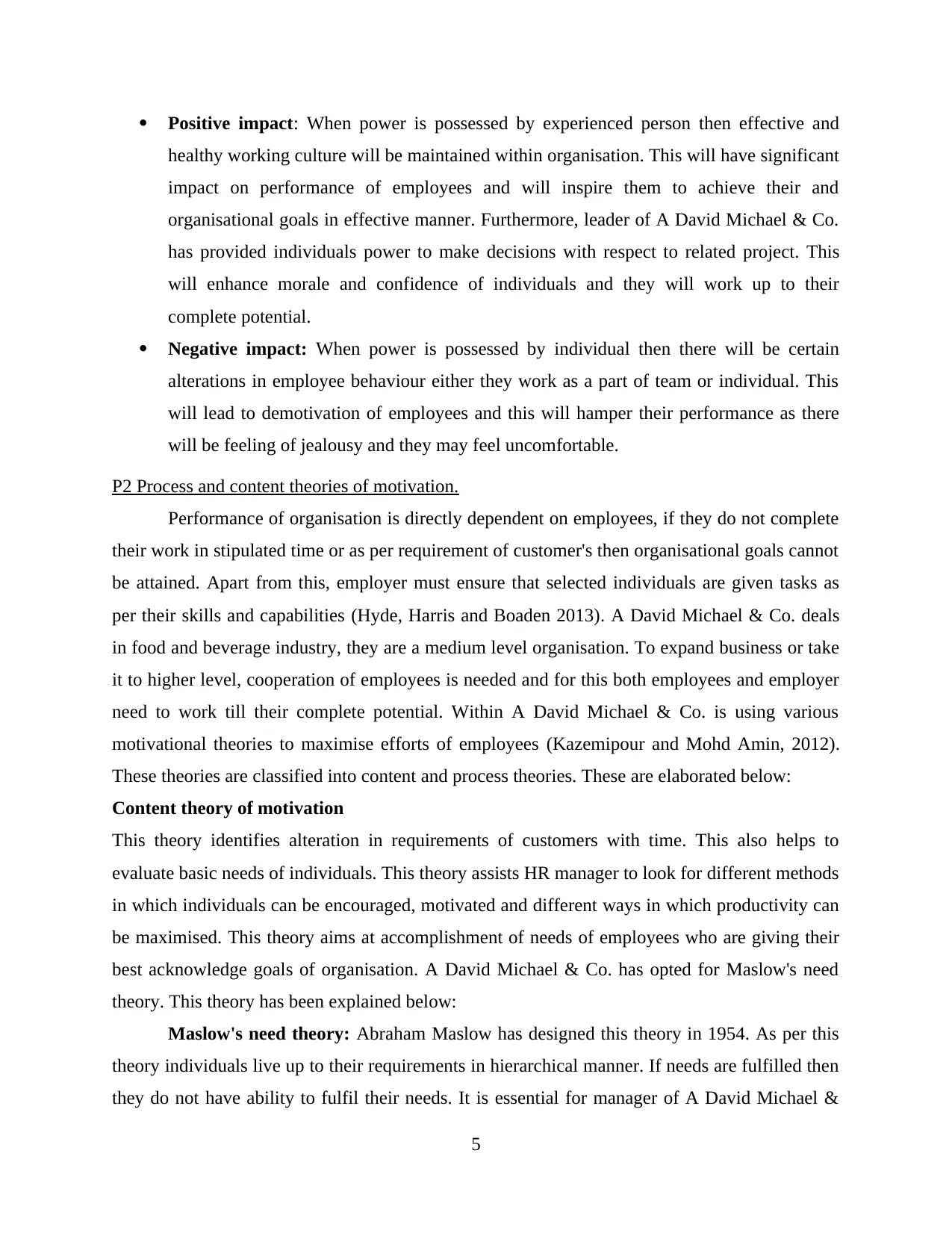
Positive impact: When power is possessed by experienced person then effective and
healthy working culture will be maintained within organisation. This will have significant
impact on performance of employees and will inspire them to achieve their and
organisational goals in effective manner. Furthermore, leader of A David Michael & Co.
has provided individuals power to make decisions with respect to related project. This
will enhance morale and confidence of individuals and they will work up to their
complete potential.
Negative impact: When power is possessed by individual then there will be certain
alterations in employee behaviour either they work as a part of team or individual. This
will lead to demotivation of employees and this will hamper their performance as there
will be feeling of jealousy and they may feel uncomfortable.
P2 Process and content theories of motivation.
Performance of organisation is directly dependent on employees, if they do not complete
their work in stipulated time or as per requirement of customer's then organisational goals cannot
be attained. Apart from this, employer must ensure that selected individuals are given tasks as
per their skills and capabilities (Hyde, Harris and Boaden 2013). A David Michael & Co. deals
in food and beverage industry, they are a medium level organisation. To expand business or take
it to higher level, cooperation of employees is needed and for this both employees and employer
need to work till their complete potential. Within A David Michael & Co. is using various
motivational theories to maximise efforts of employees (Kazemipour and Mohd Amin, 2012).
These theories are classified into content and process theories. These are elaborated below:
Content theory of motivation
This theory identifies alteration in requirements of customers with time. This also helps to
evaluate basic needs of individuals. This theory assists HR manager to look for different methods
in which individuals can be encouraged, motivated and different ways in which productivity can
be maximised. This theory aims at accomplishment of needs of employees who are giving their
best acknowledge goals of organisation. A David Michael & Co. has opted for Maslow's need
theory. This theory has been explained below:
Maslow's need theory: Abraham Maslow has designed this theory in 1954. As per this
theory individuals live up to their requirements in hierarchical manner. If needs are fulfilled then
they do not have ability to fulfil their needs. It is essential for manager of A David Michael &
5
healthy working culture will be maintained within organisation. This will have significant
impact on performance of employees and will inspire them to achieve their and
organisational goals in effective manner. Furthermore, leader of A David Michael & Co.
has provided individuals power to make decisions with respect to related project. This
will enhance morale and confidence of individuals and they will work up to their
complete potential.
Negative impact: When power is possessed by individual then there will be certain
alterations in employee behaviour either they work as a part of team or individual. This
will lead to demotivation of employees and this will hamper their performance as there
will be feeling of jealousy and they may feel uncomfortable.
P2 Process and content theories of motivation.
Performance of organisation is directly dependent on employees, if they do not complete
their work in stipulated time or as per requirement of customer's then organisational goals cannot
be attained. Apart from this, employer must ensure that selected individuals are given tasks as
per their skills and capabilities (Hyde, Harris and Boaden 2013). A David Michael & Co. deals
in food and beverage industry, they are a medium level organisation. To expand business or take
it to higher level, cooperation of employees is needed and for this both employees and employer
need to work till their complete potential. Within A David Michael & Co. is using various
motivational theories to maximise efforts of employees (Kazemipour and Mohd Amin, 2012).
These theories are classified into content and process theories. These are elaborated below:
Content theory of motivation
This theory identifies alteration in requirements of customers with time. This also helps to
evaluate basic needs of individuals. This theory assists HR manager to look for different methods
in which individuals can be encouraged, motivated and different ways in which productivity can
be maximised. This theory aims at accomplishment of needs of employees who are giving their
best acknowledge goals of organisation. A David Michael & Co. has opted for Maslow's need
theory. This theory has been explained below:
Maslow's need theory: Abraham Maslow has designed this theory in 1954. As per this
theory individuals live up to their requirements in hierarchical manner. If needs are fulfilled then
they do not have ability to fulfil their needs. It is essential for manager of A David Michael &
5
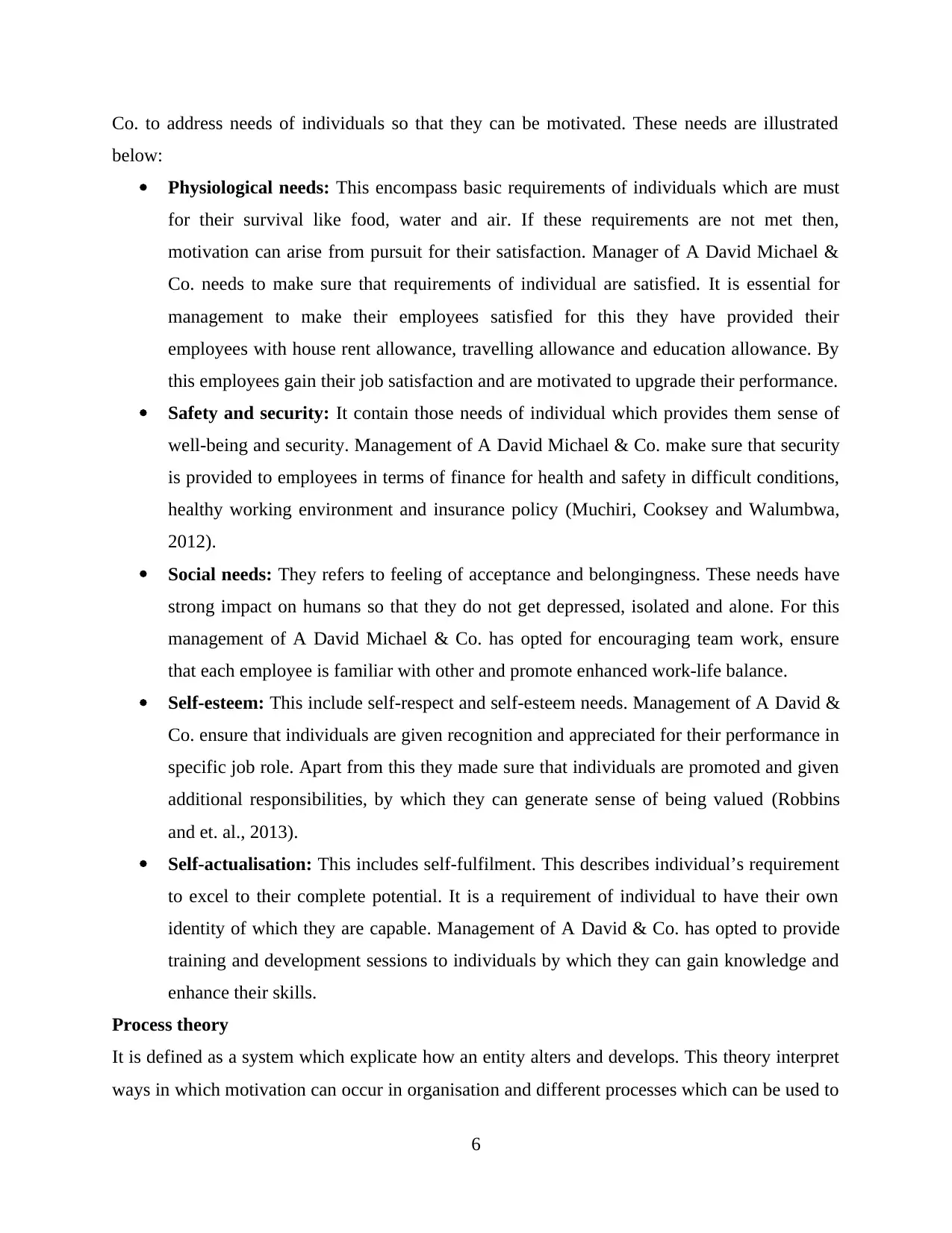
Co. to address needs of individuals so that they can be motivated. These needs are illustrated
below:
Physiological needs: This encompass basic requirements of individuals which are must
for their survival like food, water and air. If these requirements are not met then,
motivation can arise from pursuit for their satisfaction. Manager of A David Michael &
Co. needs to make sure that requirements of individual are satisfied. It is essential for
management to make their employees satisfied for this they have provided their
employees with house rent allowance, travelling allowance and education allowance. By
this employees gain their job satisfaction and are motivated to upgrade their performance.
Safety and security: It contain those needs of individual which provides them sense of
well-being and security. Management of A David Michael & Co. make sure that security
is provided to employees in terms of finance for health and safety in difficult conditions,
healthy working environment and insurance policy (Muchiri, Cooksey and Walumbwa,
2012).
Social needs: They refers to feeling of acceptance and belongingness. These needs have
strong impact on humans so that they do not get depressed, isolated and alone. For this
management of A David Michael & Co. has opted for encouraging team work, ensure
that each employee is familiar with other and promote enhanced work-life balance.
Self-esteem: This include self-respect and self-esteem needs. Management of A David &
Co. ensure that individuals are given recognition and appreciated for their performance in
specific job role. Apart from this they made sure that individuals are promoted and given
additional responsibilities, by which they can generate sense of being valued (Robbins
and et. al., 2013).
Self-actualisation: This includes self-fulfilment. This describes individual’s requirement
to excel to their complete potential. It is a requirement of individual to have their own
identity of which they are capable. Management of A David & Co. has opted to provide
training and development sessions to individuals by which they can gain knowledge and
enhance their skills.
Process theory
It is defined as a system which explicate how an entity alters and develops. This theory interpret
ways in which motivation can occur in organisation and different processes which can be used to
6
below:
Physiological needs: This encompass basic requirements of individuals which are must
for their survival like food, water and air. If these requirements are not met then,
motivation can arise from pursuit for their satisfaction. Manager of A David Michael &
Co. needs to make sure that requirements of individual are satisfied. It is essential for
management to make their employees satisfied for this they have provided their
employees with house rent allowance, travelling allowance and education allowance. By
this employees gain their job satisfaction and are motivated to upgrade their performance.
Safety and security: It contain those needs of individual which provides them sense of
well-being and security. Management of A David Michael & Co. make sure that security
is provided to employees in terms of finance for health and safety in difficult conditions,
healthy working environment and insurance policy (Muchiri, Cooksey and Walumbwa,
2012).
Social needs: They refers to feeling of acceptance and belongingness. These needs have
strong impact on humans so that they do not get depressed, isolated and alone. For this
management of A David Michael & Co. has opted for encouraging team work, ensure
that each employee is familiar with other and promote enhanced work-life balance.
Self-esteem: This include self-respect and self-esteem needs. Management of A David &
Co. ensure that individuals are given recognition and appreciated for their performance in
specific job role. Apart from this they made sure that individuals are promoted and given
additional responsibilities, by which they can generate sense of being valued (Robbins
and et. al., 2013).
Self-actualisation: This includes self-fulfilment. This describes individual’s requirement
to excel to their complete potential. It is a requirement of individual to have their own
identity of which they are capable. Management of A David & Co. has opted to provide
training and development sessions to individuals by which they can gain knowledge and
enhance their skills.
Process theory
It is defined as a system which explicate how an entity alters and develops. This theory interpret
ways in which motivation can occur in organisation and different processes which can be used to
6
⊘ This is a preview!⊘
Do you want full access?
Subscribe today to unlock all pages.

Trusted by 1+ million students worldwide

enhance confidence and morale of individuals. There are different process theories. Management
of A David Michael & Co. has opted for Locke's theory of motivation. This is described beneath:
Locke's Theory of Motivation or goal setting theory: This theory is given by Edwin
Locke. Emphasis is on goals setting, key determinant of motivation, creating ambitious
performance objectives and earnestness to attain formulated goals. Management of A David &
Co. provide each and every detail in which they need to work so that their performance can be
enhanced and they can work till their potential, this will lead to accomplishment of tasks within
stipulated duration of time. With this manager acknowledge needs of employees by which their
commitment and loyalty can be attained. This also helps Management of A David & Co. to
formulate their objectives and goals.
Motivational techniques will assist management of specific organisation to motivate their
employees as this will result in enhancement in their performance and achievement of goals of
organisation. Management of A David Michael & Co. can build challenging environment for
their employees by which their skills will be polished and they can gain more knowledge in
respective domain. By this competition among employees can be maximised (Thomson and Van
Niekerk, 2012).
P3 Effective team conflicting to an ineffective team.
In present scenario where competition is increasing, it is necessary for
management to engage their employees in effective manner so that enhanced results can be
obtained. For this it is necessary to acknowledge effective and ineffective teams before a team is
required to be formulated. However, effectiveness of team individual works within group or
team so that identical goal can be attained. They act as a strong part of organisation which is
successful. These are individuals who share their work and help each other when it is required.
By this they can successfully accomplish their task (Wang and Ritchie, 2012). On the other hand,
ineffective teams are teams who have constituted agreed viewpoint, this means that there is no
sharing of idea.
Types of team in organisation:
Functional Team: This comprises of individuals who have identical operations and they
are responsible for only those managers or leaders who have given them specific responsibilities.
This includes sales manager, HR division, etc.
7
of A David Michael & Co. has opted for Locke's theory of motivation. This is described beneath:
Locke's Theory of Motivation or goal setting theory: This theory is given by Edwin
Locke. Emphasis is on goals setting, key determinant of motivation, creating ambitious
performance objectives and earnestness to attain formulated goals. Management of A David &
Co. provide each and every detail in which they need to work so that their performance can be
enhanced and they can work till their potential, this will lead to accomplishment of tasks within
stipulated duration of time. With this manager acknowledge needs of employees by which their
commitment and loyalty can be attained. This also helps Management of A David & Co. to
formulate their objectives and goals.
Motivational techniques will assist management of specific organisation to motivate their
employees as this will result in enhancement in their performance and achievement of goals of
organisation. Management of A David Michael & Co. can build challenging environment for
their employees by which their skills will be polished and they can gain more knowledge in
respective domain. By this competition among employees can be maximised (Thomson and Van
Niekerk, 2012).
P3 Effective team conflicting to an ineffective team.
In present scenario where competition is increasing, it is necessary for
management to engage their employees in effective manner so that enhanced results can be
obtained. For this it is necessary to acknowledge effective and ineffective teams before a team is
required to be formulated. However, effectiveness of team individual works within group or
team so that identical goal can be attained. They act as a strong part of organisation which is
successful. These are individuals who share their work and help each other when it is required.
By this they can successfully accomplish their task (Wang and Ritchie, 2012). On the other hand,
ineffective teams are teams who have constituted agreed viewpoint, this means that there is no
sharing of idea.
Types of team in organisation:
Functional Team: This comprises of individuals who have identical operations and they
are responsible for only those managers or leaders who have given them specific responsibilities.
This includes sales manager, HR division, etc.
7
Paraphrase This Document
Need a fresh take? Get an instant paraphrase of this document with our AI Paraphraser

Project Team: As per this theory, different departments are involved in accomplishment
of particular task. When task is distributed equally based on capabilities of individual, then there
will be no conflicts (Xerri and Brunetto, 2013).
Task Force Team: When emergency arises within organisation then this team is
formulated. This team works as individual unit, which works together to identify solution
to primary problems and cooperate with one other in such a way that effective and feasible
solution can be found.
Effective team Ineffective team
It occurs as a two-way communication
among team.
Leadership, participation and jobs are
equally distributed as per capabilities of
individual.
They have clear viewpoint of goals for
which they work as a single unit.
Conflicts do not occur.
It takes place a one-communication
between members of team.
In this delegated style of leadership is
used in which tasks are not divided
based on skills of individual and they
are also not equal.
Goals of team are obligatory on team
members. Each individual pretends to
gain competitive vantage from other
team member.
Conflicts occur as tasks are not allotted
equally.
Management of A David & Michael Co. must make sure that healthy and open discussion
occurs between employees who are working on common goal. When effective teams are built
then tasks can be easily allotted based on capabilities of individual. When ineffective teams are
formulated then it will be difficult for leader to attain gaol in desired time. Employees must
effectively engage this means that tasks can be accomplished within required time. It is
necessary for management or employers to build healthy relation with employees as it will assist
them to gain knowledge in other domains also. Annual turnover of A David & Michael Co. is
between £10M to £20M. To enhance their productivity and profitability, they must expand their
business in other locations also. For this effective teams must be formulated (Weng, and et. al.,
2015).
8
of particular task. When task is distributed equally based on capabilities of individual, then there
will be no conflicts (Xerri and Brunetto, 2013).
Task Force Team: When emergency arises within organisation then this team is
formulated. This team works as individual unit, which works together to identify solution
to primary problems and cooperate with one other in such a way that effective and feasible
solution can be found.
Effective team Ineffective team
It occurs as a two-way communication
among team.
Leadership, participation and jobs are
equally distributed as per capabilities of
individual.
They have clear viewpoint of goals for
which they work as a single unit.
Conflicts do not occur.
It takes place a one-communication
between members of team.
In this delegated style of leadership is
used in which tasks are not divided
based on skills of individual and they
are also not equal.
Goals of team are obligatory on team
members. Each individual pretends to
gain competitive vantage from other
team member.
Conflicts occur as tasks are not allotted
equally.
Management of A David & Michael Co. must make sure that healthy and open discussion
occurs between employees who are working on common goal. When effective teams are built
then tasks can be easily allotted based on capabilities of individual. When ineffective teams are
formulated then it will be difficult for leader to attain gaol in desired time. Employees must
effectively engage this means that tasks can be accomplished within required time. It is
necessary for management or employers to build healthy relation with employees as it will assist
them to gain knowledge in other domains also. Annual turnover of A David & Michael Co. is
between £10M to £20M. To enhance their productivity and profitability, they must expand their
business in other locations also. For this effective teams must be formulated (Weng, and et. al.,
2015).
8
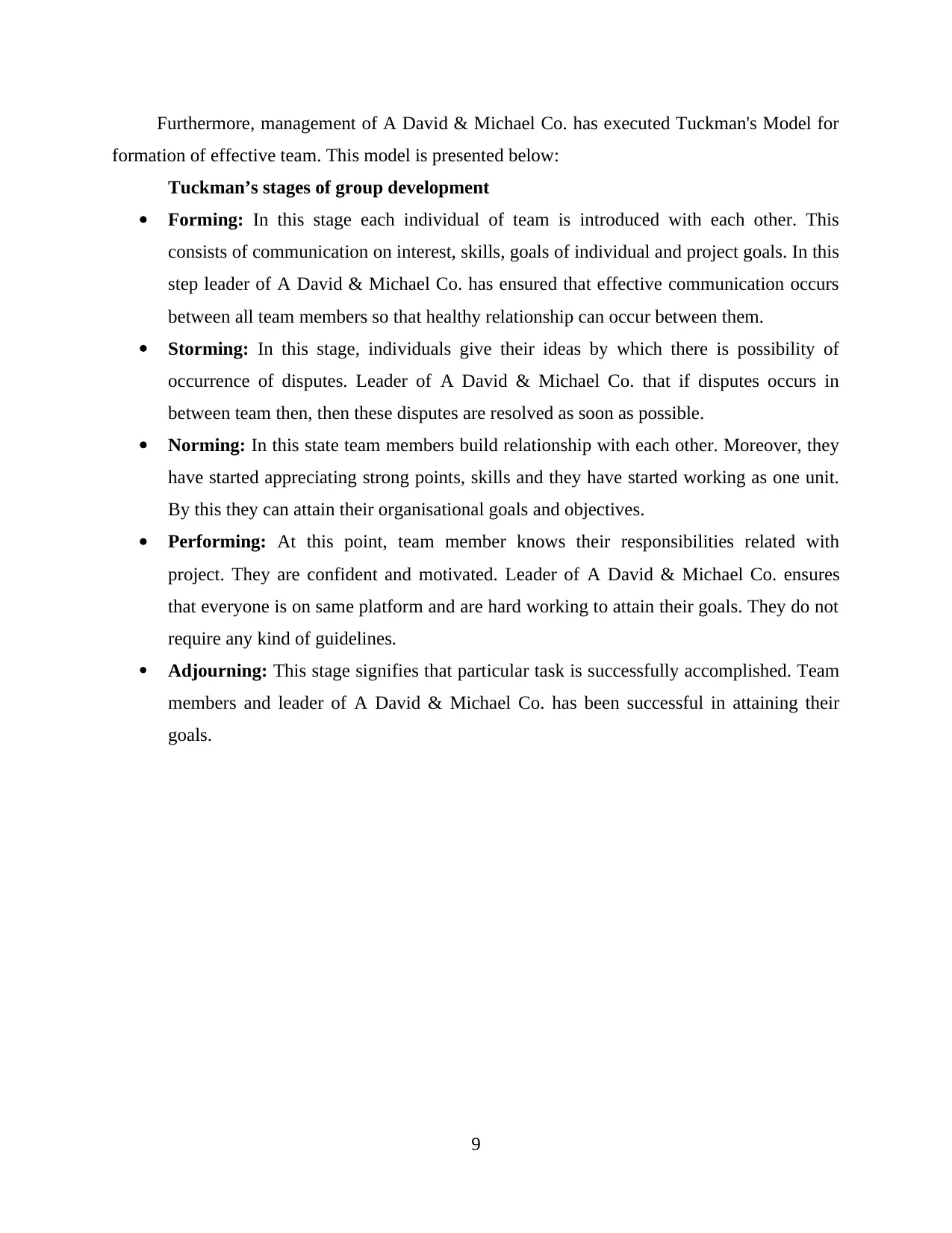
Furthermore, management of A David & Michael Co. has executed Tuckman's Model for
formation of effective team. This model is presented below:
Tuckman’s stages of group development
Forming: In this stage each individual of team is introduced with each other. This
consists of communication on interest, skills, goals of individual and project goals. In this
step leader of A David & Michael Co. has ensured that effective communication occurs
between all team members so that healthy relationship can occur between them.
Storming: In this stage, individuals give their ideas by which there is possibility of
occurrence of disputes. Leader of A David & Michael Co. that if disputes occurs in
between team then, then these disputes are resolved as soon as possible.
Norming: In this state team members build relationship with each other. Moreover, they
have started appreciating strong points, skills and they have started working as one unit.
By this they can attain their organisational goals and objectives.
Performing: At this point, team member knows their responsibilities related with
project. They are confident and motivated. Leader of A David & Michael Co. ensures
that everyone is on same platform and are hard working to attain their goals. They do not
require any kind of guidelines.
Adjourning: This stage signifies that particular task is successfully accomplished. Team
members and leader of A David & Michael Co. has been successful in attaining their
goals.
9
formation of effective team. This model is presented below:
Tuckman’s stages of group development
Forming: In this stage each individual of team is introduced with each other. This
consists of communication on interest, skills, goals of individual and project goals. In this
step leader of A David & Michael Co. has ensured that effective communication occurs
between all team members so that healthy relationship can occur between them.
Storming: In this stage, individuals give their ideas by which there is possibility of
occurrence of disputes. Leader of A David & Michael Co. that if disputes occurs in
between team then, then these disputes are resolved as soon as possible.
Norming: In this state team members build relationship with each other. Moreover, they
have started appreciating strong points, skills and they have started working as one unit.
By this they can attain their organisational goals and objectives.
Performing: At this point, team member knows their responsibilities related with
project. They are confident and motivated. Leader of A David & Michael Co. ensures
that everyone is on same platform and are hard working to attain their goals. They do not
require any kind of guidelines.
Adjourning: This stage signifies that particular task is successfully accomplished. Team
members and leader of A David & Michael Co. has been successful in attaining their
goals.
9
⊘ This is a preview!⊘
Do you want full access?
Subscribe today to unlock all pages.

Trusted by 1+ million students worldwide
1 out of 18
Related Documents
Your All-in-One AI-Powered Toolkit for Academic Success.
+13062052269
info@desklib.com
Available 24*7 on WhatsApp / Email
![[object Object]](/_next/static/media/star-bottom.7253800d.svg)
Unlock your academic potential
Copyright © 2020–2026 A2Z Services. All Rights Reserved. Developed and managed by ZUCOL.





